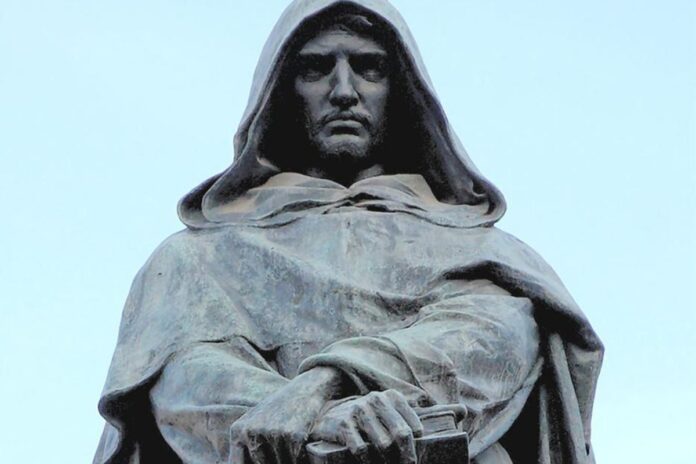Giordano Bruno (born Filippo Bruno, January or February 1548 – 17 February 1600) was an Italian philosopher, poet, alchemist, astrologer, cosmological theorist, and esotericist. Known for his radical cosmological theories, Bruno extended the Copernican model by proposing that the stars were distant suns, each surrounded by their own planets, which he speculated might harbor life—an idea known as cosmic pluralism. He also argued that the universe is infinite and lacks a central point, challenging conventional views of his time. Bruno’s mystical and Hermetic beliefs intertwined with his scientific ideas, making him a controversial figure. His theories ultimately led to his execution for heresy by the Catholic Church.
Introduction
Giordano Bruno, a name that echoes through the annals of philosophy, astronomy, and religious thought, was a revolutionary thinker whose ideas pushed the boundaries of science and belief. He challenged the established views of the cosmos in ways that no one had dared to before. Born in Italy during the 16th century, Bruno’s radical theories ultimately led him to confront the powers of his time in a battle between science, religion, and freedom of thought. In this article, we’ll dive deep into the life, ideas, and tragic end of Giordano Bruno, exploring how he helped lay the foundation for modern science and philosophy.
Early Life and Education
Giordano Bruno’s Roots
Giordano Bruno was born in 1548 in Nola, a small town near Naples in southern Italy. From a young age, Bruno showed an exceptional aptitude for learning. He entered the Dominican Order, but his inquisitive nature soon led him to question the doctrines of the Church. His thirst for knowledge led him to study not just theology but also philosophy, mathematics, and the natural sciences.
Rejection of Traditional Beliefs
As Bruno’s intellectual pursuits expanded, so did his skepticism of the religious and scientific ideas of the time. He came to reject the geocentric model of the universe (the idea that Earth was the center of the cosmos) and embraced the Copernican heliocentric theory, which proposed that the Earth revolved around the Sun. But Bruno didn’t stop there—he expanded on Copernicus’s ideas, suggesting that the stars were suns with their own planets orbiting them, thus challenging the conventional view of a finite universe.
Revolutionary Ideas
The Infinite Universe
One of Giordano Bruno’s most groundbreaking contributions was his idea of an infinite universe. At a time when many believed the universe was finite and the Earth was its center, Bruno boldly argued that the universe was boundless. He believed that there were countless other worlds, all governed by the same natural laws. This radical thought contradicted the teachings of the Church, which insisted that God had created the universe in a perfect, orderly fashion with Earth at its center.
Bruno’s notion of an infinite universe was not just a theological or philosophical idea; it laid the groundwork for later developments in cosmology. His theories foreshadowed the modern understanding of the cosmos as vast and ever-expanding.
The Nature of God
Bruno also proposed a pantheistic view of God, meaning he believed God was not a distant, separate entity but instead was immanent in all of nature. This idea placed Bruno in direct opposition to the Catholic Church, which upheld the idea of a personal, transcendent God. Bruno’s pantheism was part of his broader vision of a universe that was dynamic, interconnected, and alive with divine energy.
Conflicts with the Church
Bruno’s Heretical Views
Bruno’s radical ideas, particularly his rejection of Church doctrines, led to accusations of heresy. He was accused of promoting dangerous ideas about the nature of the universe, the existence of multiple worlds, and the nature of God. His ideas challenged the fundamental beliefs of the Catholic Church, which had a stranglehold on intellectual and spiritual life in Europe at the time.
Bruno’s outspoken views on cosmology, coupled with his unorthodox theological positions, made him a target of the Inquisition. In 1592, he was arrested in Venice and eventually handed over to the Roman Catholic authorities in Rome.
Trial and Execution
The trial of Giordano Bruno was a pivotal moment in history. After seven years of imprisonment and interrogation, Bruno was found guilty of heresy and was sentenced to death. On February 17, 1600, he was burned at the stake in the Campo de’ Fiori in Rome. His execution was a tragic end to the life of a man who dared to challenge the status quo and ask questions that were considered dangerous.
Legacy and Impact
The Enlightenment and Modern Science
Though Bruno’s life was cut short by the forces of religious orthodoxy, his ideas would have a profound impact on the future of science and philosophy. His belief in the infinite universe, the heliocentric model, and the nature of God as immanent in all things helped lay the intellectual foundation for the Enlightenment. Thinkers such as Galileo Galilei and Isaac Newton, who would go on to revolutionize science, were deeply influenced by Bruno’s daring ideas.
Bruno’s ideas on the infinity of the universe and the nature of God also had a lasting impact on the development of modern cosmology and the philosophy of science. Today, his contributions are recognized as foundational in our understanding of the universe.
Philosophical Influence
Bruno’s work has influenced not just scientists, but philosophers and thinkers throughout history. His ideas about the infinite, interconnected universe were echoed by later thinkers such as Baruch Spinoza, Immanuel Kant, and even Albert Einstein. Bruno’s courageous pursuit of knowledge, regardless of the consequences, has made him an enduring symbol of intellectual freedom.
Frequently Asked Questions (FAQs)
Who was Giordano Bruno?
Giordano Bruno was a 16th-century Italian philosopher, poet, and astronomer whose radical ideas about the nature of the universe and the existence of multiple worlds challenged the beliefs of the Catholic Church.
Why was Giordano Bruno executed?
Bruno was executed because his views were considered heretical by the Catholic Church. His belief in an infinite universe, pantheism, and the heliocentric model of the solar system went against the Church’s teachings.
What were Giordano Bruno’s major contributions to science?
Bruno’s major contributions include his ideas about the infinite universe, the nature of God as immanent in all things, and the suggestion that stars were other suns with their own planets, which laid the groundwork for modern cosmology.
Final Thoughts
Giordano Bruno was more than just a philosopher—he was a revolutionary thinker whose ideas helped shape the course of modern science and philosophy. His tragic end serves as a reminder of the power of ideas and the dangers of challenging entrenched systems of belief. Bruno’s legacy continues to inspire those who dare to question the world around them and seek knowledge beyond the limits of conventional thought. In a world still full of mysteries, Bruno’s courage remains a beacon for intellectual freedom and exploration.




